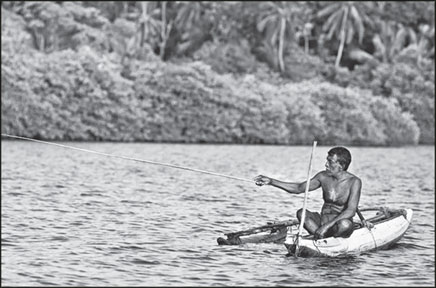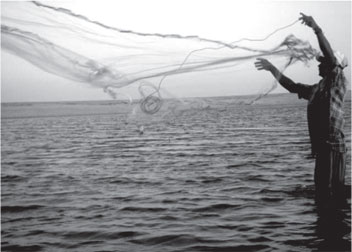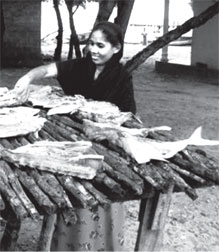Inland fisheries industry - a new wave in development
By Lionel WIJESIRI
Fish are often an important ingredient in the diet of people who live
in close proximity to water bodies. People have traditionally depended
on various indigenous fish species, easily available from nearby water
bodies, as a source of nutrition.
It is said that a large number of the 84 species of freshwater fish
found in Sri Lanka is familiar only to the local population. These
species are better known to the rural population due to the importance
the people attach to them as a vital and affordable source of nutrition.
 Inland fish production makes a significant contribution to animal
protein supplies in many of Sri Lanka’s rural areas. In some regions,
freshwater fish represent an essential, often irreplaceable source of
high quality and cheap animal protein crucial to the balance of diets in
marginally food secure communities. Inland fish production makes a significant contribution to animal
protein supplies in many of Sri Lanka’s rural areas. In some regions,
freshwater fish represent an essential, often irreplaceable source of
high quality and cheap animal protein crucial to the balance of diets in
marginally food secure communities.
In Sri Lanka, most inland fish produce is consumed locally, marketed
domestically and often contributes to the subsistence and livelihood of
poor people. The degree of participation, including a significant number
of women and children, in fishing and fish farming can be high in some
rural communities, and fish production often is undertaken in addition
to agricultural or other activities.
Challenges
Like all other food producing sectors, the inland fisheries industry
too is facing problems of environmental degradation and increasing land
and water scarcity. The agricultural sector, as a whole, is facing
increasing competition for water resources from industrialisation and
urbanisation, and from growing requirements for safe drinking water
supplies.
These issues are particularly critical, given their high dependence
on agriculture for food and income generation. In future, the demand by,
and competition among various sectors for water – in terms of quantity
and quality - will increase significantly, and politically difficult
decisions on allocation and pricing of water uses, pollution control and
other measures would have to be taken to avoid an imminent water crisis.
Degradation
Industrialisation, urbanisation, deforestation and agricultural land
and water uses often cause degradation of aquatic environments, which is
the greatest threat to inland fish production. Fishery resources are
being affected by destruction and fragmentation of aquatic habitats,
aquatic pollution due to release of industrial and urban effluents and
run-off of agro-chemicals, soil erosion and manipulation of hydrological
characteristics of rivers, lakes and flood plains.
There is increasing awareness about the urgent need to protect living
aquatic resources in inland waters, and the focus of attention includes
the requirement for conservation and sustainable use of aquatic genetic
resources. To address threats to freshwater biodiversity, increasing
national efforts are needed.
Insufficient recognition
One of the main impediments to increasing inland fish production is
that fishery/aquaculture administrators find it difficult to defend the
interests of their sector.
 |
|
An inland fisherman
spreads his net |
Decisions over developments affecting fisheries, aquaculture and
aquatic environments are often made with no consideration of these
sectors, basically for lack of trustworthy economic assessments of
present value in the case of inland fisheries and for lack of
projections of potential value in the case of aquaculture and enhanced
inland fisheries.
Most policy makers in other sectors are not aware of the importance
of inland fish production for food supplies and income generation. This
sector is often not properly represented or empowered within existing
institutional frameworks.
Most inland fish producers suffer from the inadequacy of:
* Defined rights of their specific practices;
* Institutional support, whether public or private.
This results in difficulties in obtaining credit, accessing
information and attracting efforts of capacity-building including
training and extension, in addition to low investments into the sector.
Given the lack of organisational power, the interests and needs of fish
producers are often neglected or ignored, particularly at local levels.
These challenges cannot be addressed by fishery stakeholders alone,
particularly since many of the problems are generated outside the
fisheries sector. Integration, especially better coordination of
planning and management of resources shared by fisheries and other
users, is required to facilitate sustainable inland fish production.
Fishery administrators and stakeholders should seek opportunities to
participate in the formulation and implementation of integration
measures.
Society
It is against this backdrop that the writer believes that a
strengthened Inland Fisheries Society must be formed with the following
objectives:
* Provide a forum for people working in freshwater fisheries and
aquaculture to exchange views about the role of small indigenous species
of freshwater fish in enhancing rural food and livelihood security and
in conserving biodiversity;
* Discuss the socio-economic and cultural context for culture and
capture of freshwater fish to enhance access, especially of women, to
better income, livelihood and nutritional security; and
* Propose developing policy space for sustainable use of small
indigenous freshwater fish species in fisheries and aquaculture.
Growth
In 2010, Sri Lanka’s inland fisheries production was over 52,000 tons
and increased to 59,500 tons in 2011. It is about 14 percent of the
country’s annual production.
Our target should be to reach up to 20 percent in the next five
years. For a country with 300,000 hectares of inland water reservoirs,
160,000 hectares of lagoons and 103 rivers, it is not a difficult
assignment.
 |
|
The participation of women in inland
fishing is high in some communities |
Any targeted growth in this sector would be achievable only through
increased production from capture fisheries and aquaculture, and through
the enhancement of fisheries and integrated farming systems. There is a
need, however, to ensure a balance between production enhancement and
environmental sustainability.
The Government has well understood that the inland fisheries and
aquaculture is an imperative segment with huge potential to further
develop into a thriving segment of the fisheries industry. There is a
need to increase fish production in minor perennial reservoirs, seasonal
tanks and brackish water bodies through culture-based fisheries.
The National Aquatic Development Authority (NAQDA) and National
Aquatic Resources Research and Development Agency (NARA) provide a range
of services to the private sector to develop inland fisheries and
aquaculture including public-private partnership projects and training
programs to open up opportunities to the private sector.
In addition, through its regional extension services, NAQDA offers a
variety of services to private sector investors who are seeking an
opportunity to invest in aquaculture.
Complexity
Fishery-related livelihoods are both complex and dynamic. The
importance of fisheries to livelihoods is being increasingly recognised
and their various roles understood. However, further support is needed
in three areas.
We must have a proper understanding of the different roles of
fisheries in the livelihoods of the poor in different contexts and the
issues that threaten their contribution. We must then identify
management arrangements and actions that support livelihood strategies
and contribute to reducing the vulnerability to risks of poor people
dependent on fisheries.
Taking into account these two factors, we must promote the inclusion
of fisheries in poverty reduction strategies through recognition of
their importance to the livelihoods of the poor.
|


